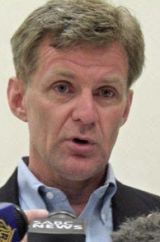UN warns of Darfur catastrophe
May 30, 2006 (BRUSSELS) — The United Nations humanitarian chief warned Tuesday of a catastrophic situation developing in Darfur unless international donors act soon to bolster a beleaguered African peacekeeping force in the Sudanese province.
 “We either get good news in the next few weeks, or we have catastrophic news later,” Jan Egeland told The Associated Press in a telephone interview.
“We either get good news in the next few weeks, or we have catastrophic news later,” Jan Egeland told The Associated Press in a telephone interview.
He said a major international conference would be held in June somewhere in Europe to try to boost humanitarian aid and assistance for the peacekeepers.
Egeland was in Brussels to meet top officials at NATO and the European Union. He said military powers should provide more resources to improve transport, communications, logistics, training and planning for the African peacekeepers.
However, he warned against deploying a Western military force, as some politicians in the United States have suggested.
“We have to be careful to calibrate the humanitarian and security response so it doesn’t provoke a reaction,” Egeland said. “I’d like to see the African Union and the U.N. play the lead role there, NATO and other organizations can complement and very usefully complement our efforts.”
A 7,300-member African Union force in place in Darfur has been largely unable to halt violence there despite a May 5 peace deal designed to end fighting that has killed nearly 200,000 people and displaced 2.5 million since 2003.
NATO and the EU have provided airlift, training and other back up for the peacekeepers and have offered more help to bolster the AU troops before they are due to hand over to a U.N. force in September.
Egeland said the Africans need more trucks and helicopters to move swiftly around the vast region. He said African nations also needed to provide more and better-trained troops and said the African Union should urgently bolster the force’s mandate so it could better protect the local population.
“The African Union force has to be strengthened, it’s them that we have to empower,” Egeland insisted. “What can be provided by military organizations, by member states of the U.N. and NATO is very welcome.”
He painted a grim picture of the situation on the ground despite the peace agreement which raised hopes of an end to Darfur’s woes.
“I’m every morning bracing myself for more bad news coming out of Darfur,” Egeland said. After reading the latest report from the region, “my hair was standing on my head,” he said. “I got shivers reading that report, every single day there is an attack on humanitarian workers or civilians.”
Egeland recently told the U.N. Security Council that the number of displaced people in South Darfur had tripled in the last four months to between 100,000-120,000. He complained local officials have blocked fuel deliveries and the movement of aid workers has been severely restricted.
In addition, areas of eastern Chad that border Darfur have been engulfed in turmoil, Egeland said. Aid groups have been forced to cut back staff and relief work because of insecurity and funding shortfalls.
Egeland said his talks at NATO and the EU were also look at the wider use of the military to help in humanitarian situations. He said military units had proven very helpful during the Asian tsunami, last year’s earthquake in Kashmir and the latest deadly quake in Indonesia.
He said an international conference would be held later this year bringing together military and humanitarian organizations to look at how to coordinate aid responses.
(ST/AP)
